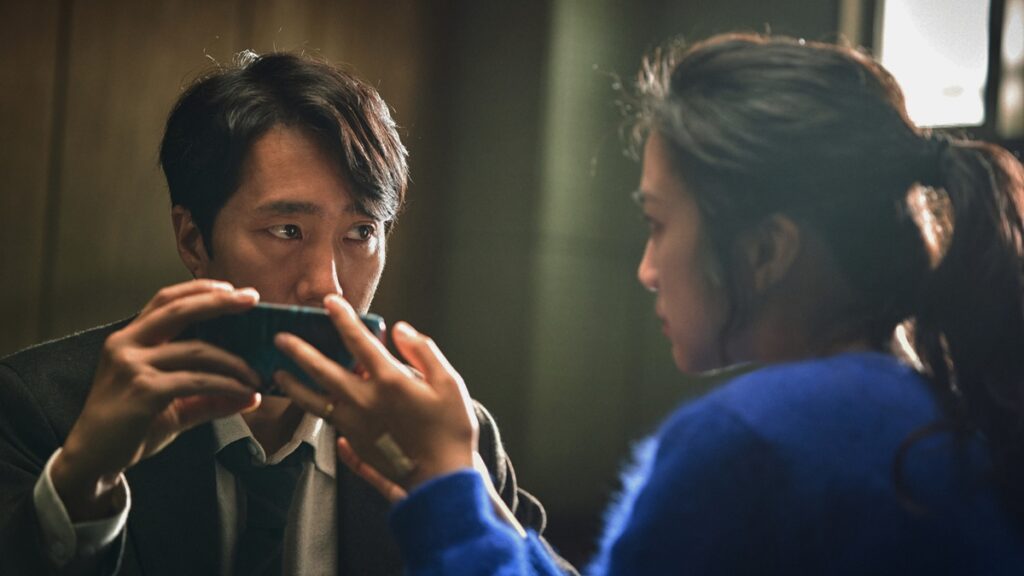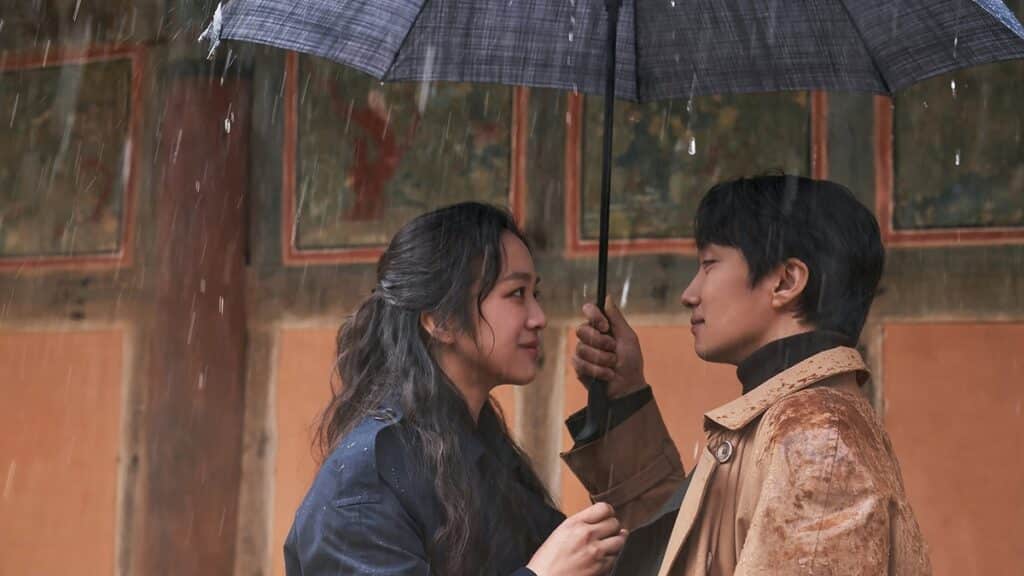The director’s latest thrills despite never truly surprising.
Park Chan-wook fans can rest assured that the director who gave us the twisty, blood-soaked passions of Oldboy, Stoker, and The Handmaiden has returned with another romantic crime-fueled drama. His latest, Decision to Leave, is high-grade neo-noir, the newest installment in Park’s ongoing exploration of the genre.
Classic elements of noir are present from the gun. The discovery of a corpse that spirals into a twisty whodunit. A mysterious, alluring beauty who may be far more dangerous than she appears. And, of course, a driven-to-the-point-of-obsession detective. Like stories of star-crossed lovers, the form’s familiarity makes it easy for failure to breed contempt from the audience. That can be dangerous territory for some. However, failing to follow through isn’t likely in Chan-wook’s case.
“Subversive” is a label that gets thrown around quite often in our current moment. Certain creatives delight in proving how little interest they have in catering to audience expectations. If it goes right, it can lead to the franchise highs of The Last Jedi and The Suicide Squad or the wickedly unexpected indie delights of The Power of the Dog. Unfortunately, it can also result in spectacular misfires like Game of Thrones’ final season and the excruciating sexism of Blonde. Park, by contrast, doesn’t subvert so much as twist noir’s language into intricate new configurations and then meticulously peel them back.

Married Detective Hae-jun (Park Hae-il) and Seo-rae (Tang Wei), the woman he suspects of murdering her husband, smolder rather than burn for each other during their surprisingly chaste affair. It’s a sharp change from the near-constant titillation of The Handmaiden, which culminated in the tender pleasure that affirmed their fairy tale-esque happy ending, and the darker undertones of the symbiotic intertwining of sex and death in Oldboy. But the truly surprising thing about Decision to Leave is how unsurprising it is.
The brooding Hae-jun has all the right components for a tragic denouement. He’s a man who prides himself on his ability to look at things directly, but every step he takes reeks of self-deception. He feels most alive when he’s involved in violent crimes, and crucially, he and his wife of nearly 17 years (Lee Jung-hyun) only see each other on weekends. She’s considerate, helpful, and quietly devoted to Hae-jun and his well-being. In other words, just the type to bore a man like Hae-jun to death.
Hae-jun’s obsession with Seo-rae feels both entirely natural and loaded with portents of doom and violence, even with Park Chan-wook’s signature brand of gallows humor keeping pace with their sword-of-Damocles romance. At least, at first. Soon, the duo’s mutual inability to view themselves with anything resembling honesty becomes so glaringly apparent that Decision to Leave nearly exhausts its almost two-and-a-half-hour runtime.
Chan-wook is too empathetic and skilled to fall into the trap of the self-righteous morality tale.
He refuses to admit his growing fascination with Seo-rae. Yet, the kind of sushi spread he orders for her during interrogation is classic Park foreplay. Hae-jun, this supposedly clear-eyed professional, then tops himself, giving her a toothbrush. When she calls, he drives to her home at breakneck speed. He then cleans her apartment after his partner trashes it with similar zeal. She puts on perfume and a good show when she’s well aware he’s surveying her. She claims she just wants a good man, yet freely chooses a partner who exploits others. There are only so many times that Hae-jun’s wedding ring can loom large in frame before the message is bolded, italicized, highlighted, and underlined.
Chan-wook is too empathetic and skilled to fall into the trap of the self-righteous morality tale. Still, this sensual fable of longing and desire errs too far on the cautionary side. It never feels as original as the films that wear their influences more openly, as was the case with Stoker. Nonetheless, it’s hard to imagine another filmmaker giving us a procedural that utilizes and embraces modern trappings rather than attempting to evade them. It builds its investigative components with cell phones, tracking apps, and surveillance footage creating a love story where stakeouts and the resulting invasions of privacy feel sexy, even welcome.
Comparisons to Hitchcock have been rampant, but even the master of suspense has a match in Chan-wook for his combination of cold methodology and delicious one-liners such as, “Killing is like smoking. Only the first time is hard.” As the noose tightens around the illicit lovers, it’s less of a slow burn than a quiet burning alive.

He is a man who more and more obviously entraps himself. It robs him of his ability to work, his other addiction. He needs that charge of violence and murder that makes him feel alive. Seo-rae is even more tragic as a woman who fled her home country by desperate, illegal means, found rocking in her own filth by Korean authorities, the only one of her fellow refugees who avoided deportation.
She killed her mother, supposedly at her request, and emerged a hardened woman unlikely to endure abuse without consequences. Yet she was trapped in a marriage to an older, corrupt immigration official who regularly doled out beatings. When not doing that, he threatened to send her back to the place from which she barely escaped. She’s a survivor who never truly survived, unwilling to suffer in silence but unable to change her pattern of self-sabotage.
If good choices are in short supply in Decision to Leave, the true enemy may be how accustomed we become to the pain we can at least control.
Decision to Leave is currently smoldering in theatres.
Decision to Leave Trailer:
Read next: The Spool's Best New Releases
Streaming guides
The Best Live TV Streaming Services With Free Trial
The praises of live TV streaming services don’t need to be further sung. By now, we all know that compared to clunky, commitment-heavy cable, live TV is cheaper and much easier to manage. But just in case you’re still on the fence about jumping over to the other side, or if you’re just unhappy with ... The Best Live TV Streaming Services With Free Trial
How to Watch Power Book III: Raising Kanan Season 3
Season 3 of the hotly anticipated Power spin-off, Power Book III: Raising Kanan, is arriving on Starz soon, so you know what that means: it’s the ’90s again in The Southside, and we’re back with the Thomas family as they navigate the ins and outs of the criminal underworld they’re helping build. Mekai Curtis is ... How to Watch Power Book III: Raising Kanan Season 3
How to Watch Doctor Who: 60th Anniversary Specials
Ladies and gentlemen, we’re so back! To celebrate Doctor Who’s 60th anniversary, the BBC is producing a three-episode special starring none other than the Tenth/Fourteenth Doctor himself, David Tennant. And to the supreme delight of fans (that would be me, dear reader), the Doctor will be joined by old-time companion Donna Noble (Catherine Tate) and ... How to Watch Doctor Who: 60th Anniversary Specials
Which Netflix Country has Interstellar?
Maybe you’ve just seen Oppenheimer and have the strongest urge to marathon—or more fun yet, rank!—all of Christopher Nolan’s films. Or maybe you’re one of the few who haven’t seen Interstellar yet. If you are, then you should change that immediately; the dystopian epic is one of Nolan’s best, and with that incredible twist in ... Which Netflix Country has Interstellar?
Which Netflix Country Has Each Movie of The Hunger Games?
For whatever reason, The Hunger Games series isn’t available in the same countries around the world. You’ll find the first and second (aka the best) installments in Hong Kong, for instance, but not the third and fourth. It’s a frustrating dilemma, especially if you don’t even have a single entry in your region, which is ... Which Netflix Country Has Each Movie of The Hunger Games?
How to Watch ESPN With A Free Trial
One of the major concerns people have before cutting the cord is potentially losing access to live sports. But the great thing about live TV streaming services is that you never lose that access. Minus the contracts and complications of cable, these streaming services connect you to a host of live channels, including ESPN. So ... How to Watch ESPN With A Free Trial
How to Watch Paramount Network With a Free Trial
To date, Paramount Network has only two original shows on air right now: Yellowstone and Bar Rescue. The network seems to have its hands full with on-demand streaming service Paramount+, which is constantly stacked with a fresh supply of new shows. But Yellowstone and Bar Rescue are so sturdy and expansive that the network doesn’t ... How to Watch Paramount Network With a Free Trial
How to Watch WE TV With a Free Trial
Previously “Women’s Entertainment,” We TV has since rebranded to accurately reflect its name and be a more inclusive lifestyle channel. It’s home to addictive reality gems like Bold and Bougie, Bridezillas, Marriage Boot Camp, and The Untold Stories of Hip Hop. And when it’s not airing original titles, it has on syndicated shows like 9-1-1, ... How to Watch WE TV With a Free Trial
How to Watch Comedy Central With a Free Trial
It’s no coincidence that many of today’s biggest comedians found their footing on Comedy Central: the channel is a bastion of emerging comic talents. It served as a playground for people like Nathan Fielder (Fielder For You), Ilana Glazer and Abbi Jacobson (Broad City), Tim Robinson (Detroiters), and Dave Chappelle (Chappelle’s Show) before they shot ... How to Watch Comedy Central With a Free Trial
How to Watch FX With a Free Trial
You’d be hard-pressed to find a bad show airing on FX. The channel has made a name for itself as a bastion of high-brow TV, along with HBO and AMC. It’s produced shows like Atlanta, Fargo, The Americans, Archer, and more recently, Shogun. But because it’s owned by Disney, it still airs several blockbusters in ... How to Watch FX With a Free Trial
How to Watch TNT Sports With A Free Trial
For many sports fans, TNT is a non-negotiable. It broadcasts NBA, MLB, NHL, college basketball, and All Elite Wrestling matches. And, as a bonus, it also has reruns of shows like Supernatural, Charmed, and NCIS, as well as films like The Avengers, Dune, and Justice League. But while TNT used to be a cable staple, ... How to Watch TNT Sports With A Free Trial